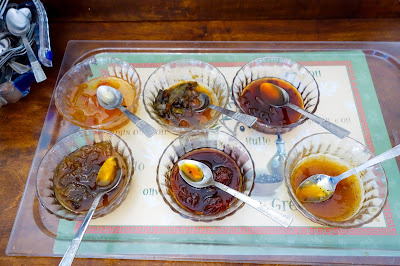 |
| Wild caper bush |
Wine making in Santorini dates back to ancient times. The volcanic explosion in around 1600BC covered the island with lava and ash creating a unique terroir for grape growing. The producers don’t use any irrigation. The grape vines are kept low to the soil so that at night they feed of the humidity in the air that is more present at ground level. Santorini is mostly known for producing dry white wines PDO (Protective Designated Origin), made from its most noble grape called Assyrtiko.
I learnt this all from a
lovely Greek lady, Maria, who produces her own homemade white wine and
Vinsanto, at her family's small cellar, from the grapes they cultivate on their
land around her shop. The shop, Faros Market, is located on the main road, past
Akrotiri, on the way to the lighthouse - south of the island.
There, at the shop, she
makes her own jams, sundried tomatoes, preserves and honey with almonds (a
traditional wedding gift) - all grown close by. She also sells local produce
such as honey, feta cheese, olives, sundried tomatoes and a delicious local
specialty, caper leaves. They are hand picked from the caper shrubs which grow
in the wild areas of the island. They are preserved in jars with water, salt
and vinegar. It tastes just like capers and adds a delicious tangy, slightly spicy
and sharp taste in salads and fish recipes.
 | |||||||
| Faros Market - Maria's shop |
 |
| Traditional homemade organic products |
 | ||
| From top left, clockwise: feta cheese, olives, olive oil, sundried cherry tomatoes and caper leaves |
 |
| From top left, clockwise: watermelon, courgette, grape, cucumber, tomato and cactus jams |
 |
| From left: honey with almond, saffron syrup and honey thyme |
 |
| Maria's family wine cellar |
Due to the restricted Easyjet weight allowance (grrrrr), I couldn’t bring much stuff back. But, I managed to squeeze in some yummy things from Maria’s shop and a half of the local wine that was given to us by our great hotel host (by the way, anyone looking for a very nice accommodation in Santorini, this is the place to stay).
In London you can
purchase caper leaves and other delicious Greek produce at the Greek Larder,
in King's Cross, or online at Isle of Olive
Back in my kitchen, in
London, I made our regular “go to” dish that we enjoyed almost everyday during
our stay in the island, with the twist of caper leaves. The Santorini Greek
salad recipe is ideal as a starter, light lunch or side dish. It tastes
great with sourdough bread to soak up the juices. This meal couldn’t be
more Mediterranean, more balanced and easy to make.
 |
| Simple... |
 | |
| ...ingredients |
 |
| My take on the Greek salad, |
Serves 2
For the vinaigrette
3 tablespoons red wine
vinegar
juice of a small half
lemon
1 sprig of fresh oregano
leaves, chopped
1 clove of garlic,
minced
6 tablespoons olive oil
Salt and pepper
Ingredients for the
salad
1 medium sized red
onion, cut in thin slices
2 small to medium cucumbers,
peeled, seeded, sliced
15 cherry tomatoes, cut
in half
12 pitted kalamata
olives
1 heaped tablespoon capers
10 capers leaves
(optional)
1 slab of organic Feta
Cheese, or one from a good provenance
1 teaspoon dried Greek
oregano
Extra virgin olive oil
for drizzle
Method
On a medium size bowl,
whisk all the vinaigrette ingredients well. Add onion and cucumber, toss and
let them marinating for about 15 minutes.
Add tomatoes,
olives, capers and caper leaves, toss carefully.
Transfer salad to a
wide, shallow serving bowl and place the feta slab over it. Drizzle with the olive
oil and sprinkle dried oregano. Serve immediately with a piece of toasted
sourdough bread. Enjoy!
P.S: If you want to make this recipe as authentic as the Santorinian, you can add sliced green or yellow peppers. My husband prefers it without them.
A healthy note: Capers and caper leaves are high in iron
and sodium (those on a low sodium diet should avoid the regular consumption of
capers). A small amount of capers will go a long way. It has an analgesic,
anti-inflammatory and antioxidant effect. Contains a bioflavonoid called rutin
which is considered to be anti rheumatic and a great treatment for arthritis
and gout. It’s diuretic and protects the liver and kidneys.
Till next week!




Wonderful Margot! Thank you for the healthy note... I didn't know that capers were so good to our health!
ReplyDeleteThank you Marcia! xxx
DeleteI loved to find out that one can eat caper leaves (pardon my ignorance). I had no idea. Great tip!
ReplyDeleteThanks Helena. It was a great discovery for me too. I am glad we are able to buy them here in London as well. xx
Delete